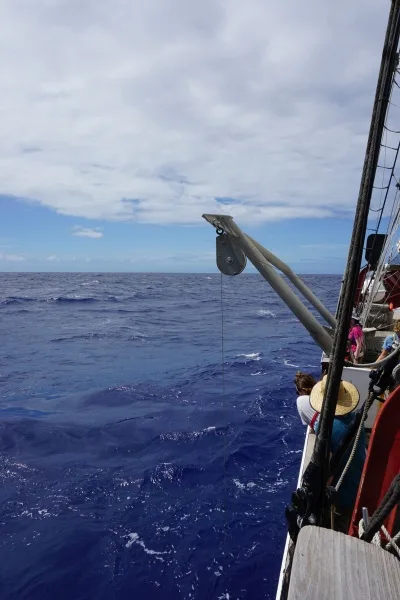Programs Blog
Honors Theses at Sea

Rhiana Boyles, C Watch, University of California, Berkeley
Ship’s Log
Noon Position
34°03.31’ N, 147°10.79’ W
Ship Heading and Speed
080.0°, 7.0 knots
Sail Plan
Sailing due east with the Main Sail, Mainstays’l, and Forestays’l
Weather / Wind
A beautiful clear and sunny day, but definitely beginning to get a bit chilly!
Plastic Count
131 pieces of plastic
What a whirlwind. One moment I found myself hiking up craters, overlooking vast reefs off the coast of Hawai’i; I currently find myself sitting below deck, traversing the Pacific Ocean back home to the California coast. Before delving into a day in the life of a student at sea, I would like to thank everyone aboard for the hard work, positivity, and joy brought to the Robert C. Seamans. Life at sea is challenging, with hardly any privacy and long hours standing watch (not to mention homework!). Vigor aside, everyone brings high spirits to every task to be managed, and I feel incredibly blessed to be a part of this crew.
Sentiment aside, I hope to provide some insight as to the life of a student at SEA participating in thesis work! I am a member of Edwards Lab at the University of California, Berkeley researching biological oceanography via lipidomic analysis. Prior to my semester at sea, I was working on a project involving certain oxidized lipids affecting reproductive success in New England oyster hatcheries. Although this was an immensely engaging project, upon conversing with my principle investigator (PI), Bethanie Edwards, I thought it might be fun to complete my honors thesis from start to finish; collecting samples first hand, before bringing them back to the lab for lipid extraction and analysis. My PI just so happened to be a SEA alumni, and we decided on a project involving my collection of phytoplankton and zooplankton samples during a semester at sea!
Aboard this research vessel, I am collecting samples to investigate triglyceride compositions in microfauna. It has always been assumed that zooplankton cannot make their own fatty acids, attaining them from their dominate food source (phytoplankton). The status quo finds itself challenged by recent evidence identifying such compounds that are not found in phytoplankton. I hope to collect samples in each latitudinal region on this voyage, bringing them back to my lab at Cal in order to discover possible fatty acids found in zooplankton that are not found in phytoplankton within the same region.
Every day, I rotate the typical watch groups explained in previous posts while making time for sampling. The phytoplankton samples are collected in Niskin bottles that are sent to 15 meters, trapping sea water via a messenger weight. Once the sea water has been collected, I sample phytoplankton via vacuum filtration within a one hour window to ensure the lipids are standardized. Zooplankton samples are collected in a neuston (surface) tow, quantified utilizing water displacement to attain a biovolume of around 4 mL. All of these samples are frozen, destined for a journey up north from San Diego.
Sometimes there are challenges with this additional undertaking. I often find myself sleep deprived, rushing up to sample my phytoplankton as soon as the sea water ventures aboard. We are also learning an incredible amount of information about nautical science and practical oceanography, and it can be challenging juggling all of our responsibilities aboard. Despite the hard ships, I am incredibly grateful for this experience and opportunity. Not to mention all of the support from crew and fellow students alike! Everyone is always teaching and learning, willing and able to help without a second thought. I could not complete this project without them, nor can I express enough gratitude (looking at you all C watch!).
Finally, I would love to give a shout out to my friends and family at home.
I think the most challenging aspect of this journey has been being apart from my two year old cat, Nami. She is a quarantine baby, and we have not spent a second apart from the moment I carried her home in my lap from the shelter. I am incredibly grateful to my parents for taking care of her, and cannot wait to see everyone when I return!
Recent Posts from the Ships
- Ocean Classroom 2024-A collaborative high school program with Proctor Academy
- Collaborations and Long-term Commitments: SEA’s Caribbean Reef Program Sets a Course for Coastal Programs that Compliment Shipboard Experiences.
- Sea Education Association students prepare for life underway using state of the art nautical simulation from Wartsila Corporation.
- SEA Writer 2022, Magazines From the Summer SEA Quest Students
- Technology@SEA: Upgrades Allow Insight into Ocean Depths
Programs
- Gap Year
- Ocean Exploration
- High School
- Science at SEA
- SEA Expedition
- SEAScape
- Pre-College
- Proctor Ocean Classroom
- Protecting the Phoenix Islands
- SPICE
- Stanford@SEA
- Undergraduate
- Climate and Society
- Climate Change and Coastal Resilience
- Coral Reef Conservation
- Marine Biodiversity and Conservation
- MBL
- Ocean Exploration: Plastics
- Ocean Policy: Marine Protected Areas
- Oceans and Climate
- Pacific Reef Expedition
- The Global Ocean: Hawai'i
- The Global Ocean: New Zealand